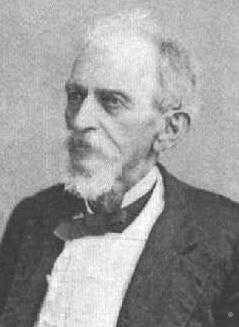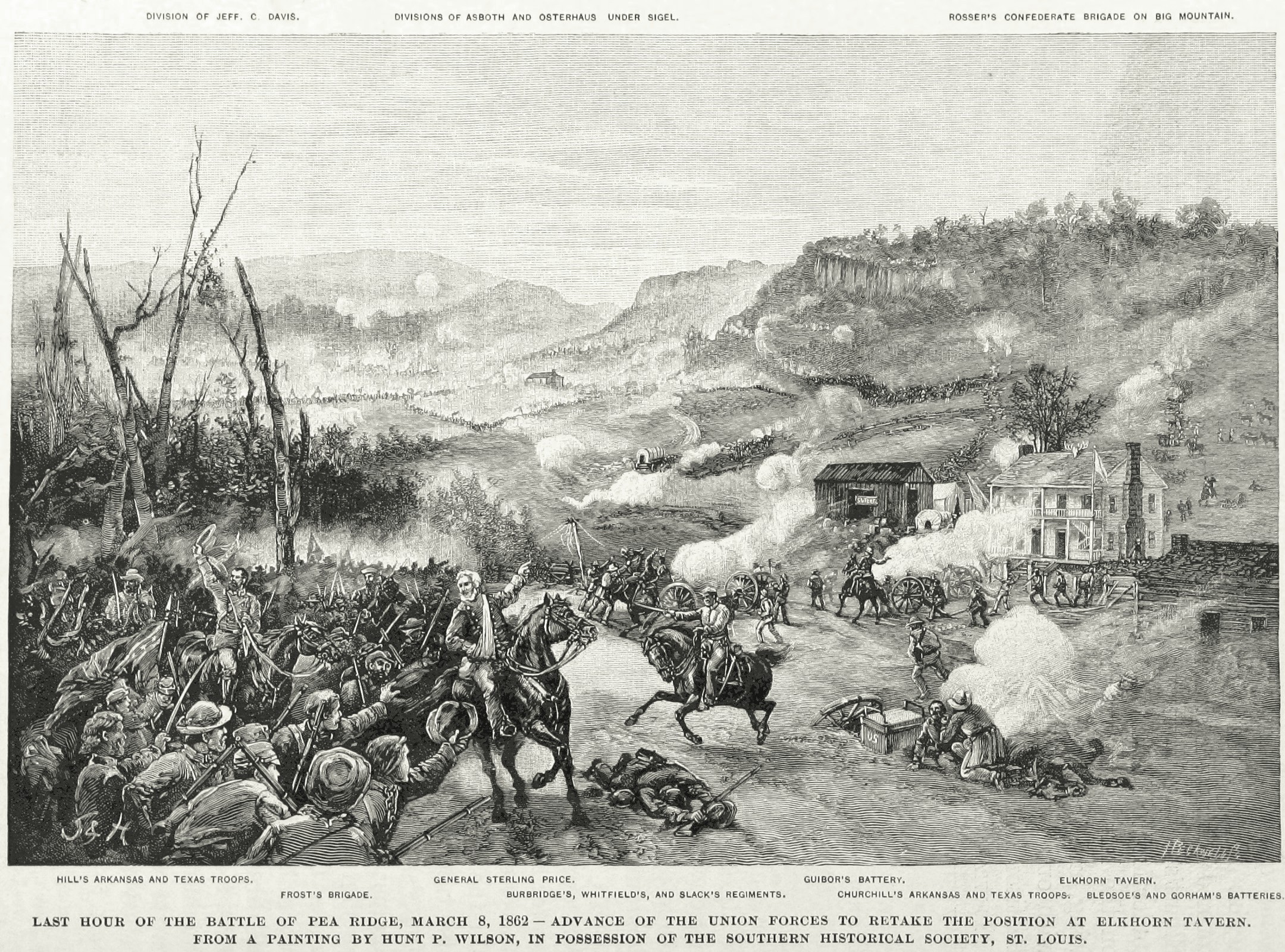|
Nathaniel Macon Burford
Nathaniel Macon Burford (June 24, 1824 – May 10, 1898) was an American politician in Texas who served as Speaker of the Texas House of Representatives between 1866 and 1869. Burford was also an attorney and a state district judge, and during the Civil War, he raised and led the 19th Texas Cavalry Regiment. Biography Burford was born to Nancy McAlister and John Hawkins Burford on June 24, 1824, in Smith County, Tennessee. He taught school at age seventeen, and later graduated from Irving College in McMinnville in 1845. He studied law in McMinnville and was accepted into the bar in 1846. At the outbreak of the Mexican–American War, Burford travelled to Knoxville to enlist, but was turned down because Tennessee's quota of troops had already been filled. After a sojourn to Shreveport, Louisiana, Burford ended up in Jefferson, Texas, in early 1847 where he clerked in the Cass County district court. Finding the local bar too full for his ambitions, he moved on to Dallas in 184 ... [...More Info...] [...Related Items...] OR: [Wikipedia] [Google] [Baidu] |
Texas House Of Representatives
The Texas House of Representatives is the lower house of the bicameral Texas Legislature. It consists of 150 members who are elected from single-member districts for two-year terms. As of the 2010 United States census, each member represents about 167,637 people. There are no Term limits in the United States, term limits. The House meets at the Texas State Capitol, State Capitol in Austin, Texas, Austin. Leadership The Speaker of the Texas House of Representatives, Speaker of the House is the presiding officer and highest-ranking member of the House. The Speaker's duties include maintaining order within the House, recognizing members during debate, ruling on procedural matters, appointing members to the various #Committees, committees and sending bills for committee review. The Speaker pro tempore is primarily a ceremonial position, but does, by long-standing tradition, preside over the House during its consideration of local and consent bills. Unlike other State legislature ( ... [...More Info...] [...Related Items...] OR: [Wikipedia] [Google] [Baidu] |
Cass County, Texas
Cass County is a county located in the U.S. state of Texas. As of the 2020 census, its population was 28,454. The county seat is Linden. The county was named for United States Senator Lewis Cass (D-Michigan), who favored the U.S. annexation of Texas in the mid-19th century. History Cass County was formed in 1846 from sections of Bowie County. It was named for Lewis Cass, a U.S. Senator from Michigan who had favored the annexation of Texas to the United States. The county was originally developed by planters for cotton plantations. By 1860, the majority of the population were enslaved African Americans. After the war, freedmen worked largely as tenant farmers and sharecroppers into the early 20th century. Black residents faced violence and discrimination in Cass County, which was the location of nine lynchings, the fifth-highest total among Texas' 254 counties. From 1861 to 1871, this county was known as Davis County, after Jefferson Davis, the president of the Confederate ... [...More Info...] [...Related Items...] OR: [Wikipedia] [Google] [Baidu] |
Episcopal Church In The United States Of America
The Episcopal Church, based in the United States with additional dioceses elsewhere, is a member church of the worldwide Anglican Communion. It is a mainline Protestant denomination and is divided into nine provinces. The presiding bishop of the Episcopal Church is Michael Bruce Curry, the first African-American bishop to serve in that position. As of 2022, the Episcopal Church had 1,678,157 members, of whom the majority were in the United States. it was the nation's 14th largest denomination. Note: The number of members given here is the total number of baptized members in 2012 (cf. Baptized Members by Province and Diocese 2002–2013). Pew Research estimated that 1.2 percent of the adult population in the United States, or 3 million people, self-identify as mainline Episcopalians. The church has recorded a regular decline in membership and Sunday attendance since the 1960s, particularly in the Northeast and Upper Midwest. The church was organized after the Americ ... [...More Info...] [...Related Items...] OR: [Wikipedia] [Google] [Baidu] |
Handbook Of Texas
The ''Handbook of Texas'' is a comprehensive encyclopedia of Texas geography, history, and historical persons published by the Texas State Historical Association (TSHA). History The original ''Handbook'' was the brainchild of TSHA President Walter Prescott Webb of The University of Texas history department. It was published as a two-volume set in 1952, with a supplemental volume published in 1976. In 1996, the New Handbook of Texas was published, expanding the encyclopedia to six volumes and over 23,000 articles. In 1999, the Handbook of Texas Online went live with the complete text of the print edition, all corrections incorporated into the handbook's second printing, and about 400 articles not included in the print edition due to space limitations. The handbook continues to be updated online, and contains over 25,000 articles. The online version includes entries on general topics, such as "Texas Since World War II", biographies such as notable Texans Samuel Houston and W. D. ... [...More Info...] [...Related Items...] OR: [Wikipedia] [Google] [Baidu] |
Philip H
Philip, also Phillip, is a male given name, derived from the Greek (''Philippos'', lit. "horse-loving" or "fond of horses"), from a compound of (''philos'', "dear", "loved", "loving") and (''hippos'', "horse"). Prominent Philips who popularized the name include kings of Macedonia and one of the apostles of early Christianity. ''Philip'' has many alternative spellings. One derivation often used as a surname is Phillips. It was also found during ancient Greek times with two Ps as Philippides and Philippos. It has many diminutive (or even hypocoristic) forms including Phil, Philly, Lip, Pip, Pep or Peps. There are also feminine forms such as Philippine and Philippa. Antiquity Kings of Macedon * Philip I of Macedon * Philip II of Macedon, father of Alexander the Great * Philip III of Macedon, half-brother of Alexander the Great * Philip IV of Macedon * Philip V of Macedon New Testament * Philip the Apostle * Philip the Evangelist Others * Philippus of Croton (c. 6th centur ... [...More Info...] [...Related Items...] OR: [Wikipedia] [Google] [Baidu] |
Ashbel Smith
Ashbel Smith (August 13, 1805 – January 21, 1886) was a pioneer physician, diplomat, slave owner, and official of the Republic of Texas, Confederate officer and first President of the Board of Regents of the University of Texas. Smith was an anti-abolitionist who helped lead efforts to keep Texas a Republic and slave state. Early life Smith was born on August 13, 1805, in Hartford, Connecticut, United States, and attended Hartford public schools. He graduated from Yale University at the age of 19 where he was a member of Phi Beta Kappa Honor society. Smith taught briefly in a private school in Salisbury, North Carolina, and then attended medical school at Yale graduating as medical doctor in 1828. He later lived in France and during the Paris cholera epidemic of 1832, Smith helped to treat the sick and wrote a pamphlet on the disease. Returning to the United States, Smith began his medical practice in Salisbury, North Carolina. He became active politically and part owner of ... [...More Info...] [...Related Items...] OR: [Wikipedia] [Google] [Baidu] |
Eleventh Texas Legislature
The Eleventh Texas Legislature met from August 6, 1866, to November 13, 1866, in its regular session. All members of the House of Representatives and about half of the members of the Senate were elected in 1865. Sessions *11th Regular session: August 6–November 13, 1866 Party summary Officers Senate ; Lieutenant Governor: George Washington Jones ; President ''pro tempore'': Robert Henry Guinn Robert Henry Guinn (January 19, 1822 – January 18, 1887) was a Texas politician. Guinn was a Democrat and served District 11, representing Cherokee County, Texas, in the Texas State Senate during the Fifth Texas Legislature, Sixth Texas Legis ..., Democrat Jones was removed from office in July 1867 by General Phillip H. Sheridan. The office of Lieutenant Governor remained vacant until 1870. Robert Henry Guinn served as acting Lieutenant Governor for the remainder of the term. House of Representatives ; Speaker of the House : Nathaniel Macon Burford, Unionist Members Members ... [...More Info...] [...Related Items...] OR: [Wikipedia] [Google] [Baidu] |
John Jay Good
John Jay Good (July 12, 1827 – September 17, 1882) was a Texan judge, soldier, and mayor of the city of Dallas.. Retrieved on August 6, 2009. Biography John Jay Good was born July 12, 1827, in Monroe County, Mississippi to George Good. He married Susan Anna Floyd, daughter of Nathaniel Crosby Floyd and Susan Umpstead Hart, on July 25, 1854, in Dallas, Texas. They had eight children: John Jay Good Jr., George, Ben McCullough, Bettie H., Nathaniel Stanley, Frances Sue, Cerelle, and Willie Good. He attended Cumberland University Cumberland University is a private university in Lebanon, Tennessee. It was founded in 1842. The campus's current historic buildings were constructed between 1892 and 1896. History 1842-1861 The university was founded by the Cumberlan ..., and studied law in Columbus, Mississippi. He was admitted to the bar in 1849 and practice law in Pikesville, Marion County, Alabama. He left Alabama with the idea to engage in the Mexican embargo wa ... [...More Info...] [...Related Items...] OR: [Wikipedia] [Google] [Baidu] |
Douglas's Texas Battery
Douglas's Texas Battery (also known as the Good-Douglas Texas Battery or Dallas Light Artillery Battery) was an artillery battery that served in the Confederate States Army during the American Civil War. In June 1861, the unit was formed by combining one group of men from Dallas with a second group from Tyler and placing them under the command of John Jay Good. The battery fought at Pea Ridge in March 1862 and soon afterward transferred to the east side of the Mississippi River. James Postell Douglas replaced Good as commander and led the battery at Richmond, Stones River, Chickamauga, Chattanooga, the Atlanta Campaign, Franklin, and Nashville. After operations around Mobile, Alabama, Confederate units in the region surrendered and the survivors of the battery were paroled on 12 May 1865. It was the only Texas field artillery unit that served east of the Mississippi. Formation On 12 March 1859, John Jay Good formed 35 Dallas residents into the Dallas Light Artillery Battery, a u ... [...More Info...] [...Related Items...] OR: [Wikipedia] [Google] [Baidu] |
Waxahachie
Waxahachie ( ) is the county seat, seat of government of Ellis County, Texas, Ellis County, Texas, United States. Its population was 41,140 in 2020. Etymology Some sources state that the name means "cow" or "buffalo" in an unspecified Native Americans in the United States, Native American language. One possible Native American origin is the Alabama language, originally spoken in the area of Alabama around Waxahatchee Creek by the Alabama people, Alabama-Coushatta people, who had migrated by the 1850s to eastern Texas. In the Alabama language, ''waakasi hachi'' means "calf's tail" (the Alabama word ''waaka'' being a loan from Spanish ''vaca''). That there is a Waxahatchee Creek near present-day Shelby, Alabama, suggests that Waxahachie shares the same name etymology. Many place names in Texas and Oklahoma have their origins in the Southeastern United States, largely due to forced removal of various southeastern Indian tribes. The area in central Alabama that includes Waxahatch ... [...More Info...] [...Related Items...] OR: [Wikipedia] [Google] [Baidu] |

.jpg)

